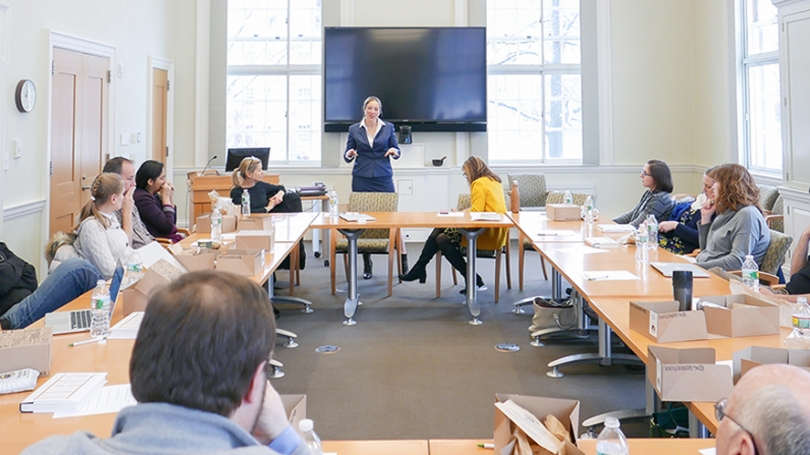
- About
- Consultation
- Programs
- Resources
- News & Events
Back to Top Nav
Back to Top Nav
Back to Top Nav
Dartmouth's New Faculty Orientation to Teaching has, in previous years, been a full-day, in-person program designed to familiarize new faculty with the people, processes, and resources of teaching at the College. The agenda has included a welcome from the College President, remarks from the Provost, a faculty panel, lunch with the librarians, a segment on advising, a session covering nuts and bolts— how to order books for your class, what all those acronyms mean, etc. — along with opportunities for reflection, connection, and socializing. In short, it has been an ambitious attempt to fit everything new faculty need to know into a short time frame.
With the shift to remote teaching and learning for the College this spring and summer, we are facing the prospect of an uncertain fall term, and the need to adapt orientation plans to accommodate a variety of possibilities.
The factors we have considered in adapting orientation plans are similar to the considerations faculty are making this term to shift their courses to remote delivery and engagement:
Additional factors, specific to new faculty, are considerations regardless of how orientation is delivered:
Based on these considerations, we made decisions according to what we deemed essential and/or reasonable in our new context. As a result, we determined that our new orientation plan must be:
The resulting plan includes a variety of approaches.
To facilitate getting to know our participants and establishing a community among them, we will adjust our pre-orientation activities. We plan to:
To accommodate participants in a variety of possible locations, and arriving at orientation with a wide range of start dates and teaching backgrounds, we will introduce remote delivery, asynchronous offerings, optional content, and a more focused core agenda.
The core agenda will consist of a half-day program of consecutive sessions to take place via Zoom, with additional in-person presence as is possible. Sessions will include:
These sessions will run synchronously between 30-60 minutes long and be interspersed with breaks. While participation in all sessions is encouraged, it is not required, and each session is designed to stand on its own. Sessions will be recorded, accessible for asynchronous viewing, and repeated at other times throughout the year.
The Nuts & Bolts activity will be adapted from its previous design, which consisted of a static Teaching FAQ resource and in-person discussion, to a more dynamic interaction. This year, the FAQ will be reformatted into a searchable digital resource that faculty can refer to throughout their teaching experience as topics become relevant and timely for them. The orientation activity will focus on introducing the resource to participants and practicing locating information within it.
Additional sessions on more in-depth or specific topics will be offered synchronously across the orientation week and recorded for asynchronous viewing. These sessions will also be designed to stand alone, and participants can opt in based on interest, timeliness, and availability. Topics may include:
While New Faculty Orientation 2020 will be quite different from previous years, we anticipate that through this thoughtful redesign, we can still meet the needs of participants and address the outcomes that we intend for this program. Additionally (and rather unexpectedly), the need to redesign New Faculty Orientation for remote or hybrid delivery has prompted us to design an experience that is more tailored to the faculty experience, more accommodating of a range of participant circumstances, and more equitable overall than the in-person, synchronous orientations of previous years.
If you are redesigning a program or training for remote or hybrid delivery, we recommend beginning with the two core questions that guide any educational program design:
In addition, consider these recommendations for ensuring an equitable experience for all participants in a remote or hybrid learning environment:
For more ideas and guides about Remote Teaching and Learning, see the Dartmouth Teach Remotely web guide.